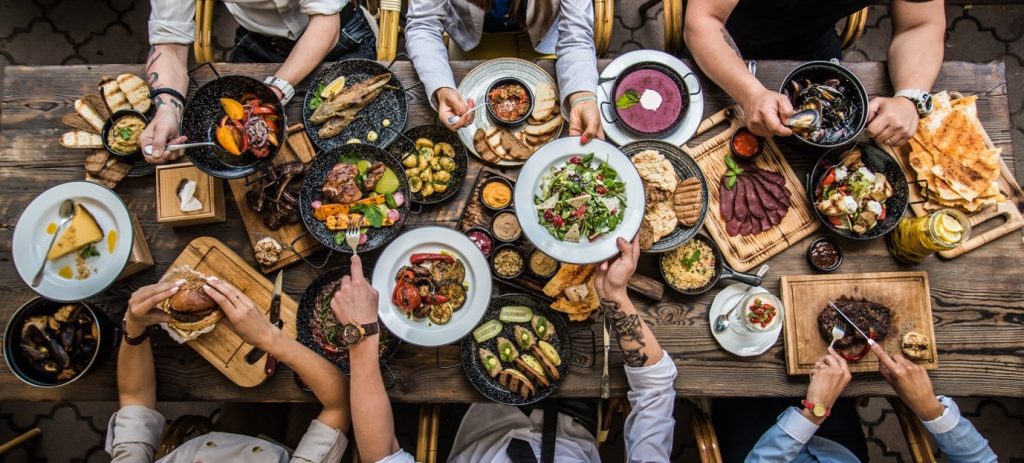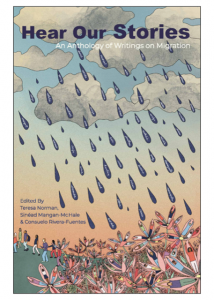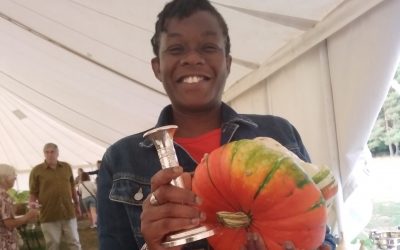Food has a powerful ability to evoke memories and emotions. We commonly associate certain food with our childhood, parents and, of course, our home country. The connection of food with family and culture features in several of the stories in the TGIUK anthology, Hear Our Stories.

There is no question that often, the taste, texture, and aroma of a particular dish can immediately transport us back in time to fond memories of our childhood, most often of our mothers cooking our favourite foods and eating together as a family. A small morsel of food can bridge the gap between our childhood or our home country thousands of miles away. Food is more than just nutrition; it brings people together. In Nine Lives, a short story in Hear Our Stories, author Mariana Serapicos, recalls how she, based in London and her mother, based in São Paulo, shared virtual dinners as they chatted over Skype. She shows us that the act of sharing food can transcend even thousands of miles.

And Natalie Gregory, the author of A Bowl of Soup, a prize-winning story in the TGIUK Storytelling competition featured in the anthology, tells how a mother magically soothed a child struggling to adjust to a new country by cooking a favourite dish. Her clever description of how “Dao feels cocooned in the coconutty broth” immediately lets the reader imagine the child’s emotions and sensations and almost to smell the delicious soup and to feel comforted themselves.
Natalie adapted her story from the draft of her first novel, Eating the Spirit, a story of a Thai-English mother who, desperate to connect with her dead mother, travels across Thailand, home and yet not home, to find lost recipes and her mother’s ghost. Having discovered the TGIUK competition online when searching for competitions with a global edge, Natalie told TGIUK,
“Entering my story in the TGIUK competition, with its focus on people who move across borders and cultures, seemed like a perfect fit. It’s an honour to be one small raindrop in this beautiful storm of migrant stories”.
Food, whilst feeding our bodies, also feeds our souls and provides comfort and familiarity. That desire for familiarity leads many of us to eat traditional foods for special days in our community – turkey at Christmas, machboos for Eid, Kugel for Passover, or Gulab Jamun for Diwali. This is not a definitive list of foods for these occasions, but rather a flavour of the many dishes representing the different regions, cultures, and family environments that shape and feed us, giving us our cultural identity. Another author in the anthology, Thomas Spoelstra, who came to the UK from South Africa as a very young child, speaks of how food connects him to his Britishness, writing, in his poem, Lost or Found?
“…I am given traditional food at home… Nationally – British citizen. I know nothing else. Victoria Sponge, Bangers and Mash, Sunday Roast, Fish and Chips and Eton Mess. This is what I know best.”

For many people, but perhaps of greater significance for migrants, the food they grew up enjoying is an essential part of their cultural heritage. Family recipes passed down through generations can connect people to their roots and provide a sense of community and tradition. With a German father and a Thai mother, and married to an English man, Natalie has the joy of blending the cuisines of many cultures to feed her memories and to give her children a taste of their multi-cultural identity.
Cooking traditional dishes reminds Natalie of her mother, who died in 2017. Natalie describes her mother as showing her love for her family through the food she cooked. Today, Natalie continues this tradition by replicating her mother’s recipes for her own family, sharing the love of both a mother and a grandmother in one dish and keeping the memory of her mother alive every single day in the most delicious ways.
And while food connects, words also bond us to memories and can help us process times of joy and times of grief. For Natalie and many writers, writing is how she makes sense of her world and allows the processing of many emotions, establishing connections to past and future key moments, people, and events.
”Writing fiction has given me the freedom to explore, sometimes unpalatable, truths about all sorts of things: identity, belonging, motherhood, grief, loss, love, hate, feeling homesick yet being at home and, in doing so, I am every day reminded of the biggest truth of all – that we are all, regardless of where we ‘come from’, simply human. Stories connect us. They are magical threads that can weave understanding and empathy into folk we initially believe are cut from a different cloth.”
While Natalie dedicated her story, A Bowl of Soup, to the memory of her mother, Wiriya (Lek) Lepper, she is also keen to share her writing with other migrants and, indeed, anyone who has experienced a loss.
“I hope others (not just other migrants) will feel that sense of longing for home in my story. Maybe even for a home that no longer exists because the time-bound nature of our memories means that even places are fleeting. But I also hope they can see that there are so many other ways to make a home that we carry the tools – our rituals, our heritage, our stories with us – like the soup in my story. For what are recipes, if not stories, made edible?”
Natalie’s story and all the other stories mentioned here feature in the deeply personal and moving collection of migrant writings, Hear Our Stories, which will be published in August 2023 by Support Us. You can pre-order your copy of Hear Our Stories through this Link.






